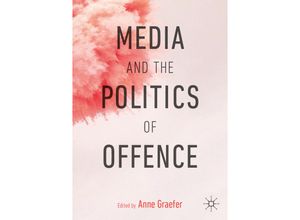This book explores different forms of mediated offence in the context of Trump's America
Brexit Britain and the rise of far-right movements across the globe. In this political
landscape the so-called 'right to offend' is often seen as a legitimate weapon against a
'political correctness gone mad' that stifles 'free speech'. Against the backdrop of these
current developments this book aims to generate a productive dialogue among scholars working
in a variety of intellectual disciplines geographical locations and methodological traditions.
The contributors share a concern about the complex and ambiguous nature of offence as well as
about the different ways in which this so-called 'negative affect' comes to matter in our
everyday and socio-political lives. Through a series of instructive case studies of recent
media provocations the authors illustrate how being offended is more than an individual
feeling and is instead closely tied to political structures and power relations.



